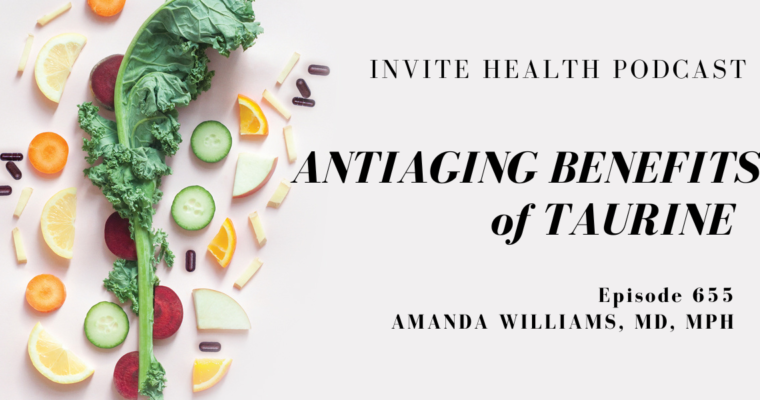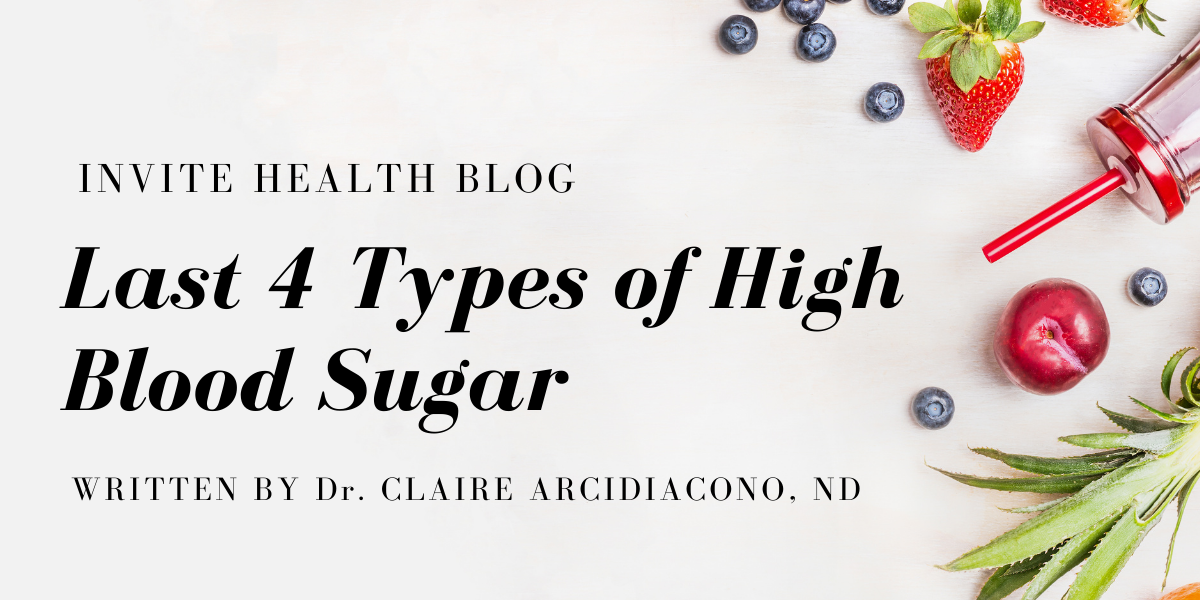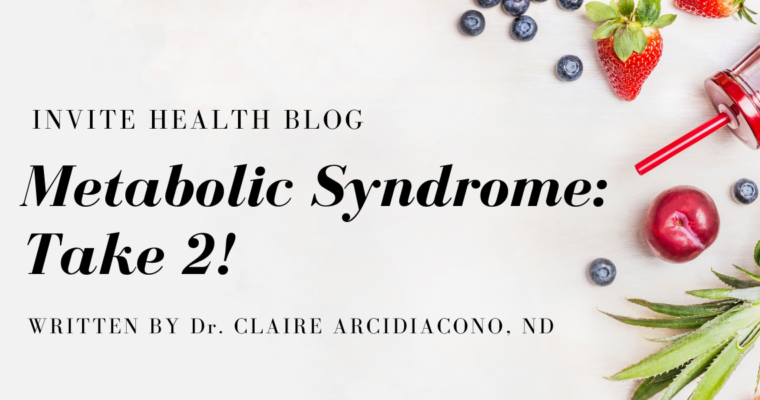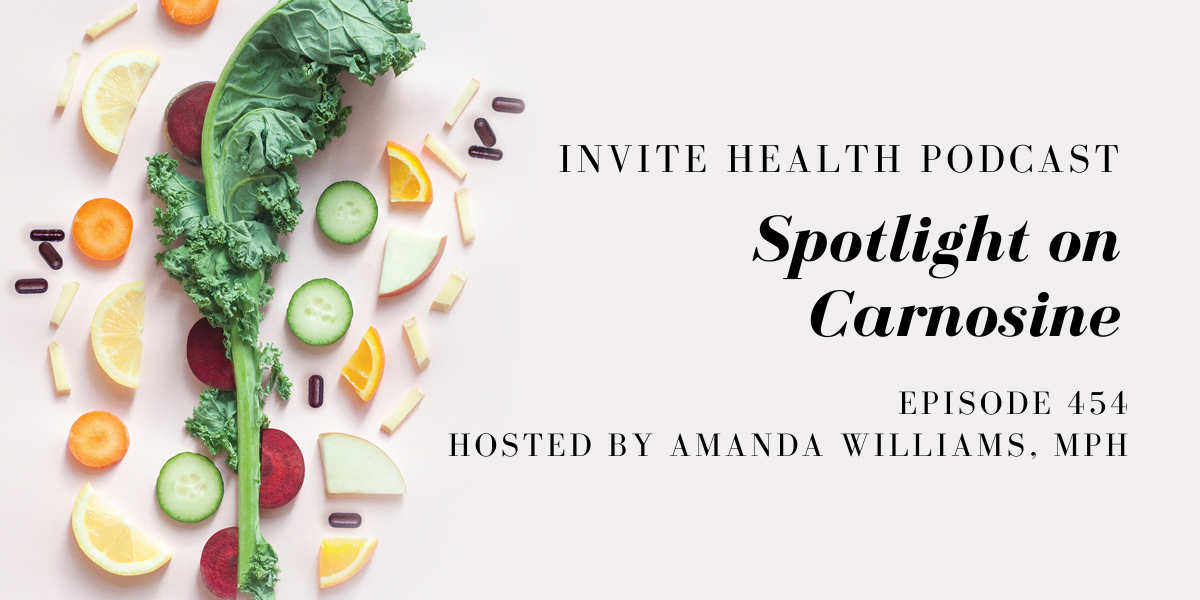Written by: Dr. Claire Arcidiacono, ND
For further questions or concerns email me at carcidiacono@invitehealth.com

Last week we covered metabolic syndrome. Today we are going to talk about a few topics that may seem unrelated but are important to any discussion of high blood sugar. In this blog we will talk about gestational diabetes, stress induced high blood sugar, type 3 diabetes and lastly drug induced high blood sugar.
WHAT IS GESTATIONAL DIABETES?
Gestational diabetes is high blood sugar that occurs during pregnancy. While gestational diabetes doesn’t usually cause symptoms there can be an increase in thirst and more frequent urination. Gestational diabetes is usually found during a routine prenatal visit. Risk factors for gestational diabetes include the typical type 2 diabetes risks (see prior blog!) as well as having, had gestational diabetes in prior pregnancies and PCOS. Complications for the mother include a higher risk of developing type 2 diabetes, as well as high blood pressure, pre-eclampsia and there is an increased chance that a C-section will need to be performed. As for the baby there are risks of excessive birth weight, obesity, type 2 diabetes, low blood sugar and breathing difficulties. Additionally there is a higher risk of both preterm birth as well as having a still birth. Please see the end blog for help managing gestational diabetes. (1)
STRESS
Stress as we know can affect almost every part of the body. Part of the reason for this is because stress can cause an increase in the cortisol released. Cortisol is basically the hormone that helps us get away from what is causing us to be stressed or in danger. When it comes to blood sugar this means cortisol is released to keep the blood sugar high. This makes sense because the higher the blood sugar the more energy is available to get away from the danger. In school we are taught to picture running away from a tiger. Cortisol works by causing the body to decrease the amount of insulin that is released. Cortisol also promotes the liver to release its stores of glucose thus raising blood sugar. Long term stress can lead to chronically high blood sugar levels. This in turn can lead to metabolic syndrome and even type 2 diabetes. While high levels of cortisol can increase blood sugar even in non-diabetics it is even worse in those with both type one and type 2 diabetes since it can make it more difficult to regulate blood sugar. While stress induced high blood sugar isn’t an official diagnosis it is important to know that long term chronic stress can increase blood sugar and that addressing chronic stress can help with blood sugar that is starting to increase. High blood sugar associated with stress has the same symptoms and complications as pre-diabetes. (2) Please see my blog on pre-diabetes. For ideas on how to help manage stress as well as high blood sugar please see the end of this blog.
METABOLIC SYNDROME: TAKE 2!>>READ NOW!
TYPE 3 DIABETES
What is meant by the new term “type 3 diabetes”? While type 3 diabetes is not currently a diagnosis it is a proposed term to describe the link between Alzheimer’s disease and both type 1 and type 2 diabetes. While not all patients with Alzheimer’s have high blood sugar there has been a link fond between the two. This link is currently being researched. One possible cause that is being studied to see if it is a link between the 2 is, insulin resistance theory which is that in type 3 diabetes the neurons (being insulin resistant) begin to lack glucose which is important for them to work properly. This a lead to a decrease in memory, judgment and ability to reason all of which are signature symptoms of Alzheimer’s disease. Another link being researched is that of increased cholesterol which says that high cholesterol leads to an increase in amyloid which generates plaque. The presence of Amyloid proteins are used as a sign of Alzheimer’s disease progression. High cholesterol is also associated with metabolic syndrome which is associated with high blood sugar. Another theory being researched is regarding oxidative stress. High blood sugar is associated with oxidative stress which can damage cells. This damage has been found to cause a decrease in cognition in type 2 diabetics. Lastly type 2 diabetes has been found to increase the likelihood of cell damage due to a process called lipid peroxidation. This process has been observed in patients with Alzheimer’s disease. While there is no one, linking diabetes and Alzheimer’s disease, there is evidence showing that there is a link and that more research is needed. Symptoms of this new disease include the symptoms of both Alzheimer’s disease and type 2 diabetes. For those with type 1 diabetes we see the symptoms of type 1 diabetes as well as changes in brain development in those diagnosed at a young age. Other symptoms in those with both type 1 and type 2 diabetes can include progressive memory loss, loss of judgment, and both spatial /visual issues. Mood swing including both anxiety and depression can occur. As the disease continues to progress the symptoms become more severe and can include an inability to communicate, seizures, weight loss, and incontinence. While there is no proven method to prevent Alzheimer’s disease there are ways to help manage overall risk. (3)
Last but not least I wanted to mention that there are a number of medications that can lead to an increase in blood sugar.
ICYMI: DIABETES TYPE 2>>READ NOW!
For more information go to https://www.trihealth.com/institutes-and-services/diabetes/living-w-diabetes/medications/medications-that-affect-blood-sugar#:~:text=Medicines%20That%20Increase%20Blood%20Sugar%3A&text=Antidepressants%20(Zyprexa%2C%20risperdal%2C%20Clozaril,(Prednisone%2C%20Decadron%2C%20DepoMedrol)
LIFESTYLE MANAGEMENT-Mediterranean Diet
The Mediterranean-style has been found to help reduce the risk of gestational diabetes in studies. (4) Additionally the Mediterranean diet has been found in studies to help with the high blood sugar associated with stress and metabolic syndrome and type 3 diabetes. (5)
SUPPLEMENTATION
Magnesium as stated previously has been found to help regulate blood sugar. (6) Studies also show it is helpful in reducing the blood sugar in gestational diabetes. (7) Magnesium is also important in helping with stress and brain health. In addition to taking supplements that regulate blood sugar working with brain health is very important in type 3 diabetes. (8) Please see Invite’s Magnesium Glycinate, Magnesium citrate and Bio-avail Magnesium
Chromium as stated previously has also been found to regulate high blood sugar. (6) Studies also show that it is helpful in regulating the high blood sugar found in gestational diabetes. (9) Please see Invite’s Chromium as well as Gluco Hx!
Cinnamon as stated previously helps to regulate blood sugar (10) and studies show that it can help to regulate blood sugar in gestational diabetes. (11) Please see Invite’s C-Betics
Biotin has been found in studies to help regulate blood sugar in gestational diabetes. (12) Please see Invite’s Biotin formula!
Reducing stress helps with all forms of high blood sugar. For those who have high blood sugar associated with stress in addition to taking Magnesium, Chromium, Cinnamon and biotin it is important to reduce high stress levels.
L- theanine has been found to help reduce stress in studies. (13) Please see Invite’s L- theanine
Phosphatidylserine has been found to help regulate cortisol. This is important to help with stress as well as brain health and memory for type 3 diabetes. (14) Please see Invite’s Phosphatidylserine and Cerebral care!
Omega 3s are important for both stress and brain health and I always recommend them for type 3 diabetes since studies show they help brain health. (15) Please See Invites Fish oil, Krill oil
Magnesium also helps with stress! (It really is amazing isn’t it)? (16)
We are almost done with our topic of high blood sugar. But what is SUGAR? Next week we get to know all about sugar and it’s secrete names!
For further questions or concerns email me at carcidiacono@invitehealth.com
SOURCES
https://www.mayoclinic.org/diseases-conditions/gestational-diabetes/symptoms-causes/syc-20355339
https://www.verywellhealth.com/can-stress-cause-high-blood-sugar-5116560
https://en.wikipedia.org/wiki/Type_3_diabetes
https://www.healthline.com/health-news/mediterranean-diet-is-better-for-pregnant-women#:~:text=Mediterranean%20Diet%20Can%20Help%20Reduce%20Risk%20of%20Gestational%20Diabetes&text=Researchers%20found%20the%20healthy%20eating,weight%20gain%20and%20gestational%20diabetes.&text=Following%20the%20Mediterranean%20diet%20has,sugar%2C%20and%20reducing%20blood%20pressure%20.
https://www.ncbi.nlm.nih.gov/pmc/articles/PMC5352455/
https://www.ncbi.nlm.nih.gov/pmc/articles/PMC4027280/
https://www.ncbi.nlm.nih.gov/pmc/articles/PMC4027280/
https://balchem.com/human-nutrition-health/blog/magnesium-and-brainhealth/#:~:text=Magnesium’s%20involvement%20in%20the%20mechanics,forms%20of%20learning%20and%20memory.
https://lpi.oregonstate.edu/mic/minerals/chromium#:~:text=Women%20with%20gestational%20diabetes%20whose,those%20who%20took%20a%20placebo.
https://pubmed.ncbi.nlm.nih.gov/26406393/
https://www.ajog.org/article/S0002-9378(05)01852-1/fulltext
https://ijpp.com/IJPP%20archives/2017_61_2/159-165.pdf
https://www.ncbi.nlm.nih.gov/pmc/articles/PMC6836118/
https://www.lifeextension.com/magazine/2004/7/report_cortisol#:~:text=This%20study%20found%20that%20phosphatidylserine,intensive%20exercise%2C%20were%20not%20reduced.
https://www.ncbi.nlm.nih.gov/pmc/articles/PMC7468918/
https://balchem.com/human-nutrition-health/blog/magnesium-and-brainhealth/#:~:text=Magnesium’s%20involvement%20in%20the%20mechanics,forms%20of%20learning%20and%20memory.













